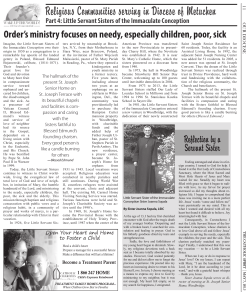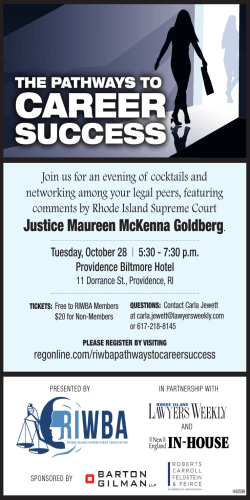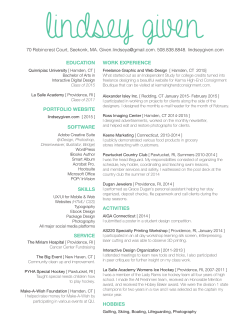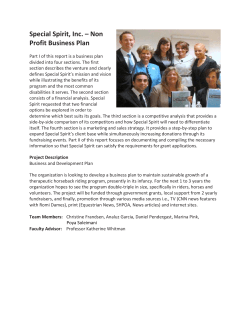
Charism - Sisters of Divine Providence
Charism of the Sisters of Divine Providence Charism of the Charism of the Sisters of Divine Sisters of Divine Providence Providence Opening Prayer Leader: Prayer for Guidance Reader 1: Trusted Guide, you are my Mentor, my Inspiration, My Home of good choices and decisions. You help me search with conidence as I ind my way to inner peace. Reader 2: Please gather your wisdom around me. Guide me carefully as I make choices about how to use my energy positively. Place your discerning touch on my mind so that I will think clearly. Place your loving ingers on my heart so I will be more fully attentive to what is really of value. Reader 3: Teach me how to hear your voice, to be aware of what is in my mind and heart, to attend to your wisdom in those around me, to acknowledge my intuitions and ponder my dreams, to listen to the earth and all of life, for in each piece of my existence you are guiding me. Readers 4: Guide of my life, thank you for all you have given to me. Reveal my spiritual path and direct me in the living of it. Lead me to inner peace and oneness with you. (From Prayers to Sophia by Joyce Rupp) Page 1 of 8 Charism Charism Excerpts from a presentation by Myra Rodgers, CDP The dynamism of a religious community is what is known as charism. To come to a deeper understanding of who we are as a congregation and what makes one congregation diferent from another congregation, we need to do a little theologizing on the word “Charism.” Sometimes a religious community “rests” in the words: “Our charism is...” but become lax in unpacking that word in this historical time and place, and in the personal lives of the sisters and associates. This discussion of charism will focus on four parts: 1. The theological meaning of the word charism, 2. Four signiicant moments in a response to a charism, 3. Challenges for this religious community today, and 4. Some questions to ponder. The theological meaning of the word charism There are many meanings to the word charism. But, the Church uses the word in its strict theological and traditional sense as written by St. Paul in I Corinthians 12:4-7. “There is a variety of gifts but always the same Spirit; there are all sorts of service to be done, but always to the same Lord; working in all sorts of diferent ways in diferent people, it is the same God who is working in all of them. The particular way in which the Spirit is given to each person is for a good purpose.” (The Jerusalem Bible) Thus Charism, as used here is the theological term for the grace, the “gift of the Spirit,” which is given to an individual or to a group for the sake of others. Some gifts are given and in the very gifting are intended for others through the person who receives: Gratia gratus data - grace freely given to the person for others. This is what Paul meant in I Corinthians -- gifts given for others. Thomas Aquinas saw this grace as theologically diferent from grace which is immediately intended to make the person receiving the grace holier: “Gratis gratum faciens.” Or, what we used to call, satisfying grace. Thus, charism as it is used today by the Church when it speaks about the charism of a religious community, uses the meaning of a grace freely given to a person or a group for others. This deinition my lead one to ask, does everyone have a charism?. Yes, everyone is gifted at baptism with gifts for the mission of Jesus. Vatican II also makes it very clear that by our baptism, we have all been gifted by the Holy Spirit and by that gifting we are conscripted, if you will, to join Jesus in His mission to announce the time of God’s favor, the coming of the reign of God. God entrusted his mission to us, the church. And, through these gifts which we received, we must proclaim in word and deed the good news of God’s coming among us in Jesus Christ through the gift of the Spirit. This mission is so central to the words and work of Jesus, that Vatican II airmed and emphasized that MISSION deines the church and that even Eucharist exists for MISSION. The Church, in every dimension of its life and practice, exists for mission: to proclaim in word and deed the reign of God to people in every culture, time and place. But, this session will look at the charism of a religious congregation, speciically the Sisters of Divine Providence. So, you may ask, what makes a charism of a religious community or the founders of a religious community so diferent and so important to the world? Four signiicant moments in a response to a charism There are four basic, but very signiicant, moments when one receives the “gift” of a charism to religious life -- this grace freely given for others: 1. A call, 2. A resonance, 3. An acceptance, and 4. A willingness to develop that call through a personal relationship with Jesus Christ. Page 2 of 8 Charism A Call: In the case of our founders, William Emmanuel von Ketteler and Marie de la Roche, the call was a deep passion that burned in their hearts and drove them to look for answers and to take action to address the needs of their time. The call, perhaps, was not something they could explain. What would make Bishop Ketteler give up his good life, his status as a lawyer, even his reputation, to take on the cause of the working person? What would make Fanny de la Roche risk losing her relationship with her family, her title, her French background, her religion, to join a group of German peasant women who had come together to answer a need in a poor section of the great city of Mainz? It was a dynamic spirit which moved them to transcend their own needs and comfort, and to reach out to meet the diiculties of their age. It impelled them to do something new and compelled them to believe in the possibility of change. The urgency which they felt in their souls grew out of a love for the age in which they lived and a faith in the people and in their historical time, coupled with a belief that God was in this place and that things could change. These Ketteler words are often quoted by us, “I love the age in which I live for its mighty wrestling with sublime ideas no matter how far we are from attaining them.” Thus the call found a resonance in the heart and soul of Emmanuel von Ketteler and Marie de la Roche. Through these two people, the Holy Spirit broke through and opened doors and windows of new possibility in 1851 in Mainz-Finthen, Germany. God found two people who would proclaim in word and deed the good news of God’s coming among us. We call this charism, foundational charism. It is the dynamic movement in the heart of two people who faced their times and believed that things could be diferent and who, through their own example, not necessarily their words, drew others to join them. Thus, the foundational charism of Bishop Ketteler and Mother Marie, which burned in their souls, was a call to new ways of being the testimony of the Gospel, a living presence. They became a living sign in their historical time. It was not the need for teaching and nursing, two of the works they began, which drew them, but they were grasped by the Spirit, illed with the Word, immersed in God’s will, determined to make God present to the people of Mainz-Finthen, to proclaim to the poorest of the poor that they were, indeed, dear to the heart of their God and that help and hope were on the way. They were led by the Spirit beyond themselves to become what they searched for: God -- the humble, just God, the God of compassion, the Provident God, the Presence of the Spirit, the gift of love, light and truth in their historical moment. We speak about these two faithful souls with a passion, almost making it sound as if they always had it together, but when we read about their lives, we can see in them their humanness, their trepidation and fear. In Ketteler’s own words, “God leads me! God chooses the weak and these uphold me and strengthen me!” But, we are also aware of their ability to listen to their souls and risk all for something they believed. Like Bishop Ketteler and Mother Marie, the call to which the members of this Congregation responded also transcended reason. We were called to a journey of the heart to something beyond explanation. It was an attraction to more than the work, it was a response to the magnet which was the God of Providence to become the face of God’s Providence, to be the Providence of God for others in our historical time and place. This grace of charism which sisters and associates respond to is not a call to the same ministries that Bishop Ketteler and Mother Marie began for the people of that time, but a call to love our times with an honesty and passion that would issue forth in a determination to meet the diiculties of our age and dare to do something diferent, to believe and work for change. A resonance: But, what good is a call if there is no resonance to the grace, the charism, in the heart of the one called. The resonance was beyond words which Page 3 of 8 Charism drew us to this congregation, not the Franciscans, nor any other community. It was an attraction to continue to enter into the mind, heart and will of the Provident God so that others could be drawn to see the Providence of God through each of us. We probably could not articulate this resonance in the words above, for many of us were drawn to the ministry of the community. But many communities do the same ministry, so why this community? Because deep down the resonance was to the charism. If the resonance is missing, the living of religious life could become a strict adherence to law and an unhappy expression of life, not a testimony to the Gospel. If the resonance is missing, the response of an associate or vowed member could be solely for her or his own “perfection,” forgetting that to ailiate oneself with a charism of a congregation carries with it the responsibility to commit one’s gifts and self to the mission of that congregation, to summon one’s energies to proclaim the reign of God through the particular focus of the congregation. In this case, to strive daily, in every circumstance in which one inds one’s self to be the face of God’s Providence. An acceptance: The call must be accepted and appreciated for what it truly is -- not a call to the works, but a call to the mission of Jesus to be the heart of God in the center of the universe and the justice of God in human misery. It is much more than just doing the work or giving the sign, it is a call to be the sign. A willingness to develop that call through a personal relationship with Jesus Christ: The development of the call through a personal relationship with Jesus Christ and in community must be rooted in the Divine, moved by the Spirit not the law, rooted in the Gospel, and impregnated with mystery. The criteria and norms by which we live must transcend personal achievement, personal security and public appreciation. If we understand our life as illed with and lowing from the charism, then our commitment to a religious congregation will be life-giving and illed with endless possibility. God meets us where we are. But, inding ourselves where we are is always the hardest part. For that we need others. As each person brings the gift of her or his personality, talents, etc., to a charism, the charism continues to deepen, expand, and come alive. Each member of the Congregation and each associate who is committed to living a Providence life will contribute to the development and expansion of the charism and mission of this Congregation. We may not do the same ministries as were done by the early community, but Bishop Ketteler’s fearless defense of the poor and Mother Marie’s faithful searching will be the heart and soul of this community and the guiding light of each vowed member and associate. Thus, we commit ourselves to developing a personal, adult relationship with Jesus, with the members of the community and will all persons with whom we contact. Challenges for this religious community today In the exhortation to members of religious congregations, “Vita Consecrata,” Pope John Paul II calls consecrated people to extend the horizon of their interpretation of their own charism so that the charism may inhabit this historical period and thus be able to listen to the needs and hopes of today’s world. This is fundamental, the Pope says, in order to bring healing and to minister in a spirit of compassion and hope. In Article 73c, the Pope goes on to say that the new challenges and situations, the crises we face today, the many problems and urgencies at hand, demand an attentive reading of the charism in order to elaborate new projects and bring new evangelization to meet today’s situations in our world. The model of religious life that we have inherited, although good, may not be enough if that model is still adhered to without relating it to this present reality. We are not doubting the model lived through the centuries, but if we have a history to build, John Paul states in Article 110a of Vita Consecrata, we need courage to return to what is essential -- the ire that burned in Bishop Ketteler and Mother Marie. Page 4 of 8 Charism We must have the courage to leave behind the encrusted cultural inlays of their time which are obsolete at present, and elaborate, with creative idelity as Pope John Paul says, responses to the present challenges along with an analysis and understanding of our reality. The model we live may well be one of the old answers to old problems of another cultural system and century. The challenge is to make our charism dynamic and evident in the way we extend its horizon in our cultural context and respond giving evangelical witness. Some questions to ponder 1. What is your understanding of the charism of the Sisters of Divine Providence. 2. How do you envision your own charism as a part of the gifts, growth and journey of the Sisters of Divine Providence? What will you share? What might you need from the Sisters? What new adventures of love, peace and justice might we undertake together? 3. Does our charism speak to the people of our time? 4. How can we as associates live the charism with more ire? 5. Are we personally living and articulating the charism, the ire of Bishop Ketteler and the faithful searching of Mother Marie? 6. What could you do to make your own Providence spirituality dynamic and robust? Page 5 of 8 Charism Closing Prayer All: O Provident God, You, the highest and iery power, have kindled every living spark; and, you have breathed out nothing that can die. You lame above the beauty of the ields; You shine in the waters, in the sun, the moon and stars. You burn. And, by means of the airy wind, You sir everything into quickness with a certain invisible life which sustains all. You, the iery power, lie hidden in these things and, they blaze from You. O Provident God, visit us with that same iery power and make us living sparks. Come, O Provident God, come! (Prayer adapted from Hildegard of Bingen) Note: Additional articles on Providence are in the section on Other Resources. Page 6 of 8 Charism
© Copyright 2026









